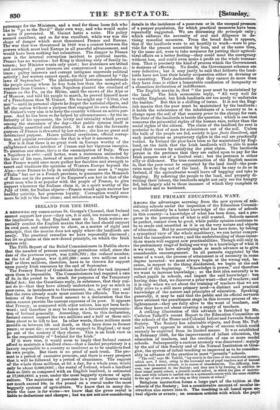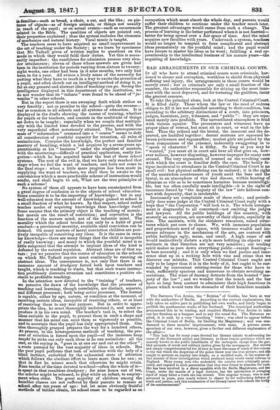THE PRIMARY EDUCATIONAL WANT.
AMONG the advantages accruing from the new system of sub- sidizing schools under the inspection of the Education Commit-- tee, will evidently be a better knowledge of the state of schools in this country—a knowledge of what has been done, and a pro- gress in the perception of what is still wanted. Schools tonna. be perfect, cannot even be good, while public opinion continues to be so crude and unsettled as it is on the very nature and objects of education. But by ascertaining what has been done, by taking a synoptical view of the whole machinery, we can better compre- hend the immediate wants ; and the understanding of those imme- diate wants will suggest new practicabilities. Though still only in the preliminary stage of feeling our way to a knowledge of what it is we want, we have already made so much advance as to give considerable encouragement. In all pursuits suggested by the sense of a want, the process of attainment is of necessity in some degree inverted : we must always begin at the wrong end, be- cause, in respect to the thing desiderated, we begin at the end instead of the beginning. "Knowledge is power," and therefore• we want to increase knowledge ; so the first idea naturally is to collect pupils in schools, and impart the said knowledge: but having done that, we discover a prior want—that of teachers; and it is only when we set about the training of teachers that we are fully alive to a still more primary need—a distinct and practical knowledge of the nature and principles of education. Speaking generally, it may be said that the public and its official servants have attained the penultimate stage in this inverse process of en- lightenment—they are fully alive to the want of teachers, and thus they have set about creating a supply of teachers.
A striking illustration of this advance is furnished by Mr. Carleton Tufnell's recent Report to the Education Committee on the schools of the Home and Colonial Infant and Juvenile Schools Society. The Society has admirable objects, and from Mr. Tuf- nell's report appears to attain a degree of success which could scarcely be expected from its limited means. It was established in February 1836, for the improvement of infant education, the education of teachers, and the erection of one or more model schools. Subsequently a curious anomaly was discovered : mainly by the aid of this Society and of the Normal Institution at Glas- gow, the system of infant teaching so improved as to be consider- ably in advance of the practice in most "juvenile" schools.
"The evil," says Mr. Tufnell, "lay mostly in the vices of the monitorial system; which now, I trust, owing to the increased use of pupil teachers and of trained masters from normal schools, is in course of abandonment. The difficulty, how- ever, was presented to the Society; and they met it by forming in addition to their infant model school, a juvenile model school, in which the plan of instruc- tion used with infants is carried out in a systematic course with the same children to the age of ten years, or as long as they remain at school."
Religious instruction forms a large part of the tuition at the schools of the Society ; but a considerable amount of secular in- struction also enters into it. The teaching is all based upon ac- tual objects or events; on common articles with which the pupil ,familiar—such as bread, a chair, a cat, and the like ; on pic- tures of objects—as of foreign animals, or things not usually in reach of the pupil ; or on actual events—such as occurrences related in the Bible. The qualities of objects are pointed out, their properties explained : thus the system includes the elements of mechanics and natural history. Vocal music is taught. The teachers seem to have acquired no small improvement in the art of teaching under the Society; as we learn by specimens that Mr. Tufnell gives of written replies to questions on the mode in which they would fulfil their duties. Yet this is neces- sarily imperfect : the candidates for admission possess very slen- der attainments; eleven of those whose answers are given had been in the institution for periods varying from sixteen to twenty- eight weeks, one other had been in it nine months, two only had been in for a year. All evince a lively sense of the necessity for putting what they have to teach in a way to excite the attention of a pupil, and often sketch out an intelligent method of doing it, so far as any general and abstract idea of teaching can go. Seeing the intelligence displayed in this department of the institution, we do not wonder that its "infants" were found to be ahead of "ju- veniles" in other schools. But in the report there is one sweeping fault which strikes us very forcibly ; not as peculiar to the school—quite the reverse— but as common to all schools and all systems of education. It is displayed in the drafts showing the course of training, whether for pupils or for teachers, and consists in the multitude of things set down to be taught ; especially when we couple that multipli- city with the limited time devoted to the process, and with the very superficial effect notoriously attained. The heterogeneous mass of " information" crammed into a " course" seems to defy all consideration of youthful capacity for retention, all rules of assimilation. Compare the knowledge, the perfect and familiar mastery of handling, which a lad acquires by a seven-years ap- prenticeship at his " business" under the stupidest of masters, with the smattering—difficult of practical application, easily for- gotten—which he has acquired under the best of these school systems. The root of the evil is, that we have only reached that stage when we feel the want of teachers, and have not come to the final stage : when a little more progress has been made in supplying the want of teachers, we shall then be awake to the convenience which a more practicable scheme of instruction would confer, and shall begin to ask, What are the true principles of such a scheme?
No system of them all appears to have been emancipated from a great degree of confusion as to the objects of school education. Some consider it to be the imparting of knowledge : but in any well-educated man the amount of knowledge gained at school is a.small fraction of what he knows. In that respect, school rather teaches modes of acquiring knowledge than knowledge itself. Some assume that the primary object is the teaching of morals : but morals are the result of conviction ; and conviction is the function of the mature mind, not of the infantile mind. The morality which the school teaches can only be a habit of good conduct—a provisional morality, available until conviction can be formed. On many matters of moral conviction children are posi- tively incapable of conceiving any ideas. It is the same in secu- lar knowledge—there are many things that the child is incapable of really knowing ; and many to which the youthful mind is so little congenial that the attempt to implant ideas of the kind is defeated by the natural repulsion. Abstract ideas are of that na- ture : yet we perceive that the course of education in the schools on which Mr. Tufnell reports must continually be running on abstract ideas. The consequence is, not only that there is an immense amount of drudgery forced both upon teachers and taught, which is teaching to waste, but that such waste instruc- tion profitlessly distracts attention and constitutes a positive ob- stacle to profitable teaching. In the attention now directed to the "training" of teachers, we _perceive the dawn of the knowledge that the processes of teaching and learning, though correlative, are distinct, separate, and different processes ; both being active processes. The learner is capable, either by age, nature, or condition at the moment, of receiving certain ideas, incapable of receiving others, or at least of receiving them to any real purpose. But in order to appro- priate the idea, he must thoroughly understand it, and must re- produce it in his own mind. The teacher's task is, to select the ideas suitable to the pupil, to present them in such a shape and manner that his mind can seize them as vigorously as possible, and to ascertain that the pupil has duly appropriated them. One idea thoroughly grasped prepares the way for a hundred others. At present, in the heterogeneous methods of teaching, the pro- cess of selection is forced upon the pupil—of the immense heap taught he picks out only such ideas as he can assimilate : all the rest, as the saying is, "goes in at one ear and out at the other "; a route pursued by the vast majority of ideas in schools. But the poor pupil performs that task of selection with the help of a blind instinct, enfeebled by the exhausted state of attention which follows the obedient effort to learn more than he can ; so that in fact he misses much that otherwise he might retain. Nine tenths of the time devoted to school—often the whole of it— is spent in that resultless drudgery ; for nine hours out of ten, the scholar might be released, to play while an infant, to employ- ment when older. The great majority of children among the humbler classes are not suffered by their parents to remain at school after ten years of age : but let more obviously fruitful methods of tuition obtain, let school cease to be regarded as an occupation which must absorb the whole day, and parents would suffer their children to continue tinder the teacher much later. The greatest advantages would ensue from such a change. The process of learning is the better performed whenit is not hurried— better for being spread over a fair space of time. And the mind acquires new faculties with years. Undersuch a system, teachers would no longer be tempted to force complicated and abstract ideas prematurely on the youthful mind ; and the pupil would have leisure to master his ideas as he went; fulfilling a real ap- prenticeship to the intellectual business of his mature years—the acquiring of knowledge.



























 Previous page
Previous page